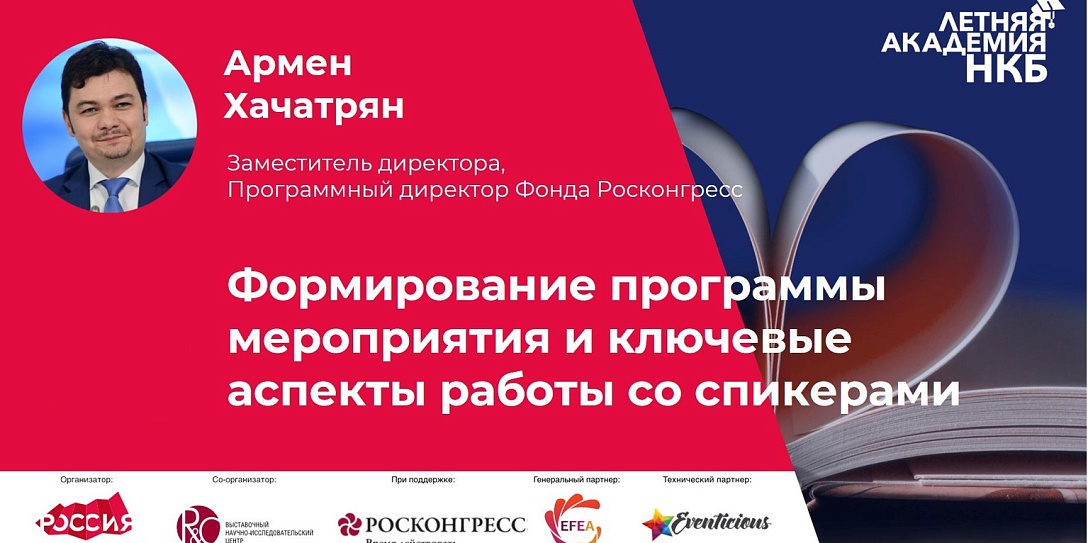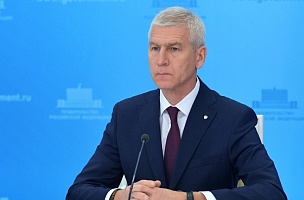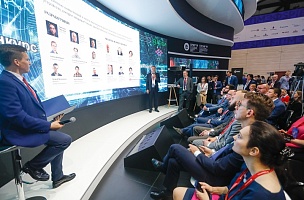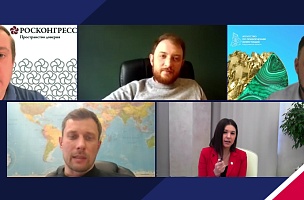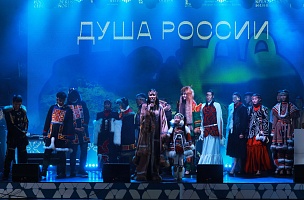The Roscongress Foundation continues sharing
its expertise in business event management as part of the National Congress
Bureau (NCB) Summer Academy. Armen Khachatrian, Deputy CEO and Programme
Director of the Roscongress Foundation, completed the project’s second module
with an online lecture ‘Designing an Event Programme and Key Aspects of
Working with Speakers’.
Mr. Khachatrian shared that shaping an event’s
business programme takes a sequence of actions and preparedness for a
force-majeure. He also addressed what makes an event attractive for a potential
speaker and spoke about changes in the contemporary event formats. Over 200
people joined the lecture.
Roscongress Foundation’s Programme Director
looked into the key stages of preparing and successful implementation of any
event’s programme. The top priority, according to Mr. Khachatrian, is to define
the event’s goal, which will bring you to determining the speakers, the topics
they are going to cover, and most importantly their audience. An insight into
an event’s target audience will help the organizers understand what their
participants and partners are looking for and give them precisely that. Further
audience segmentation will ensure a detailed structure of the business
programme and maximum outreach.
The lecture mentioned the importance of
creating a programme’s slogan that would be succinct, catch people’s eye, and
summarize the key idea of the event as a whole. It is the slogan that attracts
people and is best remembered by speakers, participants, and partners, once the
event’s over.
When addressing the sequence of actions, Mr.
Khachatrian highlighted the need for a programme committee at the onset: in
order to become meaningful and relevant, the future sessions require a pool of
subject-matter experts that will become the brain power of the whole event. The
programme committee’s first task is shaping the programme’s structure, which is
a vision of the future conference with its key topics that can be devised and
changed until its relatable to organizers and the event’s target audience.
The programme’s first draft should be based on
its structure and include a brief and condensed description of every event, as
well as the topics and narratives their speakers will need to cover. It will help
participants understand what they are likely to hear at the event and help speakers
make their input beneficial to the event’s content.
The next stage requires selecting and inviting
speakers, which is the key point of an event’s programme preparation. It takes
a lot of skill to attract subject-matter experts and persuade them to invest
their time in speaking at your event. Moreover, the high profile of the event
is another important factor for potential speakers that pushes them to make a
decision in your favour. Building a speakers’ panel is a challenging stage that
requires an insight into the audience’s tastes and the panel’s adequacy to the
announced themes. It is also important to find out their manner of public
speaking beforehand. This is something the future moderator will need to factor
in, as their technical role is key to ensuring equal opportunities for speakers
to express their thoughts and making the discussion most interesting.
Armen Khachatrian answered questions from the
audience and emphasized the importance of having a reliable team, especially
when preparing and hosting large events that might include up to 20 parallel
discussion. In this case, the key point of staying on track is personal control
over specific sessions, which includes technical and organizational aspects
(for example, making sure the speakers get the right plane tickets, an
accommodation, and the Russian visa).
The audience asked particularly many questions
about actions in case of a force-majeure and its frequency. The Roscongress
Foundation’s Programme Director noted that one must be prepared for last-minute
changes at all times, especially when it comes to high-profile speakers, whose
value to the event’s content is higher than the cost of changing banners in the
hall or the event format. One must also be prepared to replace speakers last
minute. The audience may not even notice the force-majeure if the whole team
including the session moderator act fast and seamlessly.
At the end of his lecture, Armen Khachatrian
shared that conventions tend to scale down in terms of duration and number of
speakers: “We see a trend of a higher number of shorter sessions with fewer
speakers. It is a challenge for organizers, as many people are willing to speak
and turning them down feels awkward and scary. However, this is something that
has to be done, as this is the event format the audience is ready to sign up for.”
The lecture is
available on the Roscongress Foundation’s
YouTube channel.
To recap, on 6 July Alexander Stuglev, the CEO
and Chairman of the Roscongress Foundation, gave an online lecture entitled ‘Fundamentals of
Project Management for Congress Events’ as part of the National Congress
Bureau (NCB) Summer Academy. CEO and Chairman of the Roscongress Foundation
shared some of his key practical skills accumulated over the years of
organizing congresses and exhibitions on a global scale.
Subscribe to the
Roscongress Foundation's
official Telegram channel: news, analytics, opinions,
highlights of the Russian and international agenda, summaries of the
Foundation’s business, cultural, and sporting events.


